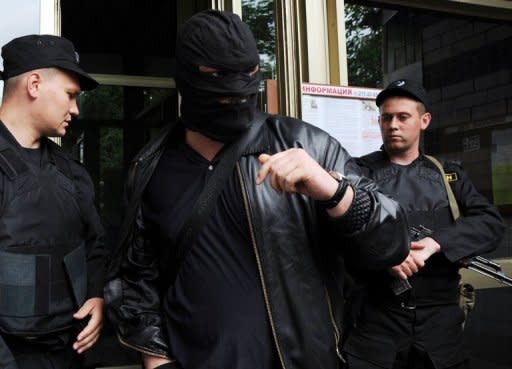Defying fines and raids, Russians to march against Putin
Russian President Vladimir Putin's opponents vowed to defy a wave of police raids and the threat of fines the size of their annual salaries to join a monthly march Tuesday against his 12-year rule. The so-called March of Millions will be the first since bloody battles broke out between riot police and the mostly young crowd during a Moscow event held on the eve of Putin's May 7 swearing in for an historic third term. Scenes of police clubs swinging against the backdrop of the Kremlin drew a sharp rebuke from Western governments and dealt a bruising political blow to Putin on the very first day of his return from a four-year stint as premier. The Kremlin swiftly responded with the kind of show of force that characterised much of Putin's 2000-2008 presidential mandate. It used its slim parliamentary majority to ram through legislation raising protest penalties to 300,000 rubles ($9,000) -- more than for any other administrative offence and about the size of Russians' average annual pay. This move signalled the determination of Putin, an ex-KGB spy, to hold on to power as tightly as he had before. Moscow police in the meantime foiled a bid by the nascent movement to keep its momentum going with Occupy-style protests by conducting repeated night-time raids against any camps they set up. The fury of protesters at the new legislation and the growing police resolve left many of the opposition's more moderate supports worried that this volatile mix would give the once-peaceful movement a violent and more radical edge. But even Putin's own human rights adviser sounded the alarm on Monday when police armed with assault rifles conducted a series of early-morning raids on the homes of the protests' most prominent leaders. "I think that from the standpoint of social harmony, modernisation and political reforms, this is the very worst that could have happened," Kremlin rights adviser Mikhail Fedotov observed. US State Department spokeswoman Victoria Nuland told reporters that Washington "is deeply concerned by the apparent harassment of Russian political opposition figures on the eve of the planned demonstrations" on Tuesday. Officers beat down the doors of the increasingly popular anti-corruption blogger Alexei Navalny as well as media celebrity Ksenya Sobchak, a more recent recruit to the ranks of Putin's critics. Others targetted in Monday's raids included Sergei Udaltsov -- an outspoken ultra-leftist who stages periodic hunger strikes to protest his repeated arrests -- and the far more moderate democracy campaigner Ilya Yashin. Russia's powerful Investigative Committee said a total of 10 raids were conducted as part of a probe into last month's demonstration. And crucially, all those raided will be required to appear for questioning on Tuesday instead of leading the anti-Putin march. They face up to 10 years in jail if charged and convicted of organising mass unrest. "This recalls 1937," campaigner Valery Borshchyov said, a reference to the most infamous year of Soviet dictator Joseph Stalin's repression. "In those days, they also made the arrests at night, in secret, when people were not working," he told Interfax. Ex-finance chief Alexei Kudrin -- a personal friend of Putin who quit last year after disputing his planned job swap with current Prime Minister Dmitry Medvedev -- said the raids showed "radicals gaining strength" in the Kremlin. Tuesday's march will be held on the patriotic Russia Day holiday marking the country's 1990 declaration of independence from Soviet rule. Moscow police said they were sending 12,000 riot officers and interior ministry troops onto the streets of the capital to keep order there.


![Opposition activists rally against a new bill that steeply increases fines for illegal protest activity in central Moscow, on June 5, 2012. The poster (L) reads: "Fascists stand for this [bill]!"](https://s.yimg.com/ny/api/res/1.2/D1M_whDykLM7LWq02drqqg--/YXBwaWQ9aGlnaGxhbmRlcjt3PTk2MDtoPTczNw--/https://media.zenfs.com/en_sg/News/AFP/photo_1339399371663-1-0.jpg)
